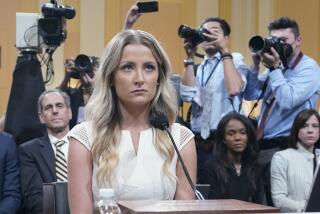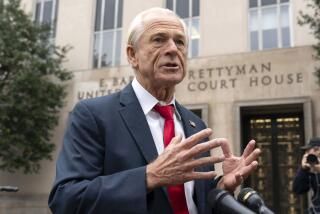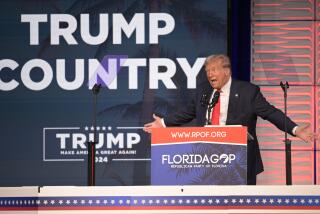John F. Kelly, hired to bring order to White House, to leave as Trump’s chief of staff after bumpy tenure
John F. Kelly, the retired four-star Marine general who became President Trump’s second chief of staff, will be leaving that post by month’s end after struggling for a year and a half to bring order to a White House beset by chaos thanks to the president’s impetuous behavior — and occasionally Kelly’s own.
Trump confirmed Kelly’s imminent departure on Saturday as he left the White House to attend the annual Army-Navy football game.
For the record:
2:55 p.m. Dec. 8, 2018An earlier version of this article reported that Rep. Frederica Wilson referred to President Trump as an “empty barrel.” The comment was made by Chief of Staff John F. Kelly in reference to Rep. Wilson. Also, the last name of Nick Ayers, Vice President Mike Pence’s chief of staff, was misspelled as Ayres.
“John Kelly will be leaving at the end of the year,” the president said, adding that he would announce a replacement — perhaps “on an interim basis” — in a day or two.
Speculation has focused on Nick Ayers, a young but seasoned Republican operative who is now chief of staff to Vice President Mike Pence.
Though the president and his chief of staff reportedly are no longer on speaking terms, Trump called Kelly, who initially served as his Homeland Security secretary, “a great guy” and said, “I appreciate his service very much.”
Kelly’s departure had been expected for months since his once-close relationship with the president publicly soured, especially after voters delivered a sweeping rebuke to the president in the 2018 midterm election by giving Democrats a net gain of 40 House seats and majority control.
“It’s really been just a lousy marriage for a long time,” said Chris Whipple, author of “The Gatekeepers: How the White House Chiefs of Staff Define Every Presidency.” “And the deal seems to be that Kelly won’t tell Trump hard truths and Trump gets to do whatever he wants, which is just a formula for bad governance.”
Kelly had impressed Trump as his first secretary of the Department of Homeland Security, and he shared many of the president’s hard-line beliefs on immigration enforcement. He moved to the White House in July 2017, determined to impose more structure on an unruly presidential decision-making process.
But the president resisted being managed, and lashed out at Kelly and other aides as the administration careened from crisis to crisis. Kelly, who had led Marines in combat in Iraq, more than once called his White House assignment the hardest he’d ever had.
“I did something wrong and God punished me, I guess,” Kelly said in March at a Homeland Security event.
From the start, Kelly saw his job as helping to get rid of troublesome White House aides, and he oversaw a record turnover of senior staff in the administration, including Cabinet officers.
In July 2018, that included the long-anticipated resignation of Trump’s most controversial Cabinet secretary, Scott Pruitt, who’d hung on as head of the Environmental Protection Agency for months despite a slew of scandals.
Kelly also stayed long enough to help Trump fill a second Supreme Court vacancy after Justice Anthony M. Kennedy announced his retirement. The Senate narrowly confirmed Brett M. Kavanaugh in October after a bruising battle that featured allegations of sexual misconduct including assault decades ago.
In both cases, Kelly remained notably in the background, a figure of diminished influence and stature within the White House.
Kelly had replaced Reince Priebus, a former Republican Party chairman. Priebus was unable to gain Trump’s trust or to control the flow of information to him as aides, friends and others seeking to sway decisions had nearly unlimited access to the president.
Trump’s search for a third chief of staff in less than two years recalled his 2012 tweet criticizing his predecessor, President Obama, who was hiring his third chief of staff in the final year of his first term. “3 Chief of Staffs in less than 3 years of being President: Part of the reason why @BarackObama can’t manage to pass his agenda,” Trump wrote.
Some in Trump’s orbit, including Republican leaders of Congress, had hoped that Kelly, who is nearly Trump’s age, would serve as a steadying force in a tumultuous White House.
Initially he succeeded. Kelly reduced the number of people who had access to the president. He also helped push out several White House aides he considered underperforming and disruptive, including chief strategist Stephen K. Bannon, advisor Sebastian Gorka, short-tenured Communications Director Anthony Scaramucci and communications assistant Omarosa Manigault Newman.
In a quick reaction to the Kelly news, Scaramucci tweeted “Ding Dong...” as if to suggest what follows in the famous song: “The witch is dead.”
Kelly was unable, however, to control Trump’s imprudent comments and tweets or end the constant infighting around him, some of which the president encouraged.
Trump made it clear that he would not change his rash style and that his staff, including Kelly, would have to adapt. In fact, Trump vented on Twitter more frequently in Kelly’s final months.
“I do not follow the tweets,” Kelly told reporters early on.
Yet, Kelly and his aides could not always ignore Trump’s words, especially when the president would insult a foreign leader, announce the firing of a senior aide or unveil a new policy without informing his staff.
Trump predictably chafed, especially at Kelly’s initial insistence on being informed about, and having the right to monitor, all of the president’s phone calls and appointments.
Trump still made late-night calls and met people outside those strictures, especially at Mar-a-Lago, his Florida resort. Kelly did not monitor most of Trump’s contacts, but often played catch-up by getting reports from those who spoke with Trump.
Kelly’s restrictions also created tension with Trump’s daughter Ivanka and son-in-law, Jared Kushner, both of whom are senior advisors and had been accustomed to unfettered access to the president.
That tension was exacerbated when Kelly, under pressure to deal with the many aides whose background checks weren’t yet approved, in February revoked Kushner’s top-secret security clearance, an interim status that Kushner had held for more than a year. In late May, Kushner finally got a permanent clearance, restoring his access to classified information.
Like others around the president, Kelly often tended to Trump’s desire for praise and a sense of control.
He reminded others in the West Wing that he was there to serve the president, not impose his own agenda, and that Trump’s status as an outsider was an asset in decision making. But the retired general had his own ego and occasionally seemed to diminish the president when he asserted it.
Kelly infuriated the president in January when he told the Congressional Hispanic Caucus that Trump’s central campaign promise to build a continuous wall along the southern border was “uninformed,” and then made similar comments to Fox News, Trump’s favorite media outlet.
While Kelly was initially seen as a far more restrained figure than Trump, over time it became clear that they had much in common, including obstinacy in the face of criticism.
In August 2017, when Trump blamed “both sides” for deadly violence at a gathering of white supremacists and counter-protesters in Charlottesville, Va., Kelly drew attention when video showed him off to the side at the news conference, hanging his head in seeming disapproval of Trump’s remarks.
But Kelly later joined Trump in defending Confederate memorials and, in one interview, suggested the Civil War was caused not by slavery but by the states’ inability to compromise.
Another defining episode occurred in October 2017 when Kelly made a rare appearance in the White House briefing room to defend Trump against accusations that he had been insensitive during a condolence call to the widow of an Army sergeant killed in Niger.
Kelly, who lost his own son in combat in Afghanistan, attacked Rep. Frederica Wilson (D-Fla.), a friend of the slain soldier’s family. With TV cameras rolling, Kelly falsely said Wilson had been a grandstander at a 2015 dedication of an FBI facility named for fallen agents and called her an “empty barrel.” Even after video of the event disproved his account, Kelly refused to acknowledge his mistake or apologize to the congresswoman.
Kelly also took heat early this year for mishandling a scandal involving Rob Porter, then White House staff secretary, after it was revealed that two ex-wives had accused Porter of abuse.
The White House had been given reports of the allegations months earlier, as part of Porter’s background check for his security clearance. Yet when they became public, Kelly initially praised Porter as a man of “integrity and honor.”
After a photo surfaced of one ex-wife with a black eye, Porter resigned and Kelly was forced to defend his initial praise. He said he’d had incomplete information, but others at the White House disputed that account.
The embarrassment apparently added to the strains in Kelly’s relationship with Trump. After that, speculation grew that Kelly’s days in the job were numbered.
Twitter: @noahbierman
More to Read
Get the L.A. Times Politics newsletter
Deeply reported insights into legislation, politics and policy from Sacramento, Washington and beyond. In your inbox three times per week.
You may occasionally receive promotional content from the Los Angeles Times.







